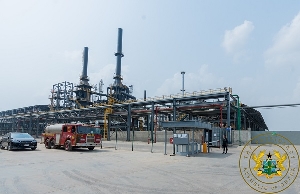The Chamber of Bulk Oil Distributors (CBOD) has vehemently opposed the government’s proposal to appoint the Bulk Energy Storage and Transportation Company (BEST) as the exclusive off-taker of Sentuo Oil Refinery Limited’s output under the gold for oil programme (G4O).
The proposal, government claims, is aimed at controlling the exchange rate by indirectly channeling Sentuo Oil Refinery’s cedi liquidity through BEST to manage USD allocations under the G4O programme.
It has, however, has been met with skepticism by industry stakeholders, with CBOD insisting that the proposed policy contradicts the deregulation policy governing the petroleum downstream sector. “We object to this proposal and respectfully appeal to the Head of the Economic Management Team (EMT), Vice President, Dr. Alhaji Mahamadu Bawumia, to review this proposal,” a statement issued by CBOD read.
“Providing the needed USD liquidity under the G4O programme can still be achieved without necessarily anchoring the entire output of Sentuo Oil Refinery Limited (SORL) with BEST, formerly known as Bulk Oil Storage and Transportation Company (BOST),” the statement argued.
Furthermore, the chamber contends that the government’s plan risks creating market challenges and deficiencies that could hinder the growth of the downstream sector in the medium to long-term. It added that by sidelining Bulk Oil Import, Distribution, and Export Companies (BIDECs), the government risks stifling private sector involvement and creating a monopolistic market detrimental to consumers.
“The G4O programme has nearly given 50 percent control of the market to BEST whereas Sentuo production accounts for 20 percent of the market needs. Having a single player control such a monumental share of the market will rob the market of the benefits of the efficiency, lower prices and growing local market expertise that the deregulation policy has occasioned,” CBOD stated.
Instead, CBOD urged the government to establish a framework that fosters fair market practices, transparency and active participation from all stakeholders.
The statement also emphasized the contributions of BIDECs to national development, including ensuring energy sufficiency during critical moments and investing in storage infrastructure. The statement concluded by reaffirming the Chamber’s commitment to working with the government to develop a workable G4O framework that promotes innovation, sustainability and efficiency within the downstream petroleum sector.
Business News of Monday, 29 April 2024
Source: thebftonline.com













